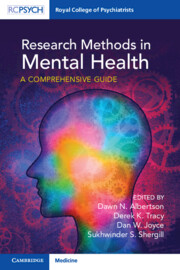
-
Select format
-
- Publisher:
- Cambridge University Press
- Publication date:
- 31 October 2025
- 20 November 2025
- ISBN:
- 9781009028967
- 9781009013987
- Dimensions:
- Weight & Pages:
- Dimensions:
- (234 x 156 mm)
- Weight & Pages:
- 0.516kg, 340 Pages
You may already have access via personal or institutional login
Book description
This practical and comprehensive resource is a must-read for anyone interested in engaging with mental health research. Covering a range of topics and methodologies, this book provides readers with everything they need to know to navigate mental health research today. Focusing on topics relevant to today's early career researchers, chapters cover the principles of research, tools and methodologies, both quantitative and qualitative, and contemporary applications. It also covers ethics, equity and co-production considerations. The inclusion of a Current Trends feature explores key concepts in current areas of lively discourse. This book will be useful for psychiatrists, clinical psychologists and other mental health professionals interested in engaging with and conducting mental health research. It will also be a valuable text for MRCPsych candidates sitting their Critical Review paper.
Reviews
‘This is a wonderful resource, essential for anyone undertaking mental health research. It is truly comprehensive since it includes not only the latest developments in neuroimaging and genetic studies, but also practical advice for achieving patient and public involvement and avoiding arguments about authorship.’
Chris Frith - University College London
‘Being an academic clinician is a core part of every clinician’s identity. Being able to appraise and evaluate research papers, to apply evidence to one’s clinical practice, and to let clinical curiosity drive collaborations that solve patient problems are key attributes of a good clinical scientist. This comprehensive resource provides the foundations to help clinicians integrate fundamental research skills in their daily lives. Resident doctors will find the volume particularly helpful in developing their critical appraisal skills.’
Subodh Dave - Subodh Dave, Dean, Royal College of Psychiatrists, Consultant Psychiatrist and Deputy Director of Undergraduate Medical Education, Derbyshire Healthcare Foundation Trust, Professor of Psychiatry, University of Bolton
Contents
Metrics
Altmetric attention score
Full text views
Full text views help Loading metrics...
Loading metrics...
* Views captured on Cambridge Core between #date#. This data will be updated every 24 hours.
Usage data cannot currently be displayed.
Accessibility standard: WCAG 2.0 A
Why this information is here
This section outlines the accessibility features of this content - including support for screen readers, full keyboard navigation and high-contrast display options. This may not be relevant for you.
Accessibility Information
The PDF of this book conforms to version 2.0 of the Web Content Accessibility Guidelines (WCAG), ensuring core accessibility principles are addressed and meets the basic (A) level of WCAG compliance, addressing essential accessibility barriers.
Content Navigation
Table of contents navigation
Allows you to navigate directly to chapters, sections, or non‐text items through a linked table of contents, reducing the need for extensive scrolling.
Index navigation
Provides an interactive index, letting you go straight to where a term or subject appears in the text without manual searching.
Reading Order and Textual Equivalents
Single logical reading order
You will encounter all content (including footnotes, captions, etc.) in a clear, sequential flow, making it easier to follow with assistive tools like screen readers.
Short alternative textual descriptions
You get concise descriptions (for images, charts, or media clips), ensuring you do not miss crucial information when visual or audio elements are not accessible.
Visual Accessibility
Use of colour is not sole means of conveying information
You will still understand key ideas or prompts without relying solely on colour, which is especially helpful if you have colour vision deficiencies.
Structural and Technical Features
ARIA roles provided
You gain clarity from ARIA (Accessible Rich Internet Applications) roles and attributes, as they help assistive technologies interpret how each part of the content functions.

